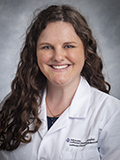Residency preceptors

Jill Starykowicz, Pharm.D., BCCCP
- Title:
- PGY-2 Critical Care Residency Program Director; Clinical Pharmacy Specialist, Cardiology/Critical Care
- Additional Information:
Education: Pharm.D., University of Illinois at Chicago, 2006
Training: PGY-1, University of Illinois at Chicago, 2007; PGY-2 Cardiology, University of Massachusetts Medical Center, 2009
Practice Area: Cardiac/Medical Intensive Care Unit
Research Interests: Delirium in the medical intensive care and severe alcohol withdrawal
Email: jill.starykowicz@aah.org
Medical/Cardiac Intensive Care Learning Experience: The MCICU and Interventional Unit consists of a 32-bed unit with 10 beds devoted to cardiology and the remaining dedicated to the medical intensive care group. The learning experience is designed for pharmacy residents to develop the skills, knowledge, and values expected by a clinical pharmacy specialist practicing in critical care medicine and tailored to the resident’s previous critical care experience. Residents participate in bedside rounds with an attending physician, medical residents and interns, emergency medicine interns, palliative care physician and nurse, clinical pharmacist, respiratory therapist, clinical ethicist, and nurses. This team meets daily to discuss and optimize patient care. In addition to bedside rounds, teaching rounds occur daily to cover topic discussions and issues related to patients in the unit. Topics are presented by various attending physician who are specialists in their area of practice.

Amina George, Pharm.D., BCCCP
- Title:
- PGY-2 Critical Care Residency Coordinator; Clinical Pharmacy Specialist, Neurocritical Care and Operating Room
- Additional Information:
Education: Pharm.D., University of Illinois at Chicago, 2008
Training: PGY-1, Advocate Lutheran General Hospital, 2009
Practice Area: Neurocritical Care Unit
Research Interests: Stroke, Traumatic Brain Injury
Email: amina.george@aah.org
Neurocritical Care Unit Learning Experience: The Neurocritical Care Unit (NCCU) is a 9 bed ICU that specializes in the care of patients with various pathologic neurologic conditions including, but not limited to, stroke, isolated traumatic brain injury, and status epilepticus. The NCCU is managed by Neurointensivists and Advanced Practice Nurses. The learning experience is designed for pharmacy residents to identify and develop the skills, knowledge, and values necessary to practice in an intensive care setting, with an emphasis on neurologic disease state management. Residents participate in multidisciplinary bedside rounds with an attending physician, APNs, nursing staff, clinical pharmacist, respiratory therapist, and medical residents and students. This team meets daily to discuss and optimize patient care.

Karen Caylor, Pharm.D., BCPS
- Specialty:
- Pediatric Intensive Care Unit
- Title:
- Clinical Pharmacy Specialist, Pediatric Critical Care
- Email:
- karen.chincaylor@aah.org
- Additional Information:
Education: Pharm.D., University of Illinois at Chicago, 2007
Training: PGY-1, Advocate Lutheran General Hospital, 2008; PGY-2 Pediatrics, University of Illinois at Chicago, 2009
Research Interests: Vancomycin dosing and kinetics in pediatrics, dexmedetomidine use in PICU patients, and opioid and benzodiazepine withdrawal in children
Pediatric Intensive Care Learning Experience:
The pediatric intensive care unit (PICU) learning experience focuses on the provision of pharmaceutical care services to the pediatric population. The PICU is a 16- bed unit that encompasses patients ranging in age from newborns to adolescents. The patient population includes traumas, post-operative cases, and general medical issues. Residents participate in daily rounds with an interdisciplinary team, of which responsibilities include: review of patient profiles, provision of drug information, development of evidence based therapeutic plans, and development of short and long-term monitoring plans. Residents also assist with pharmacokinetic monitoring, providing parenteral nutrition support, and participating in pediatric emergencies. Residents participate in one to two topic discussions each week. Topics include but are not limited to septic shock, traumatic brain injury, seizures, diabetic ketoacidosis, pressors/neuromuscular blockers, pulmonary hypertension, continuous renal replacement therapy, and extracorporeal membranous oxygenation. Residents provide education through inservices and formal presentations to the pharmacy staff, physicians, and nurses.

Jill Argotsinger, PharmD, BCIDP
- Specialty:
- Infectious Diseases, Antimicrobial Stewardship
- Title:
- PGY2 Infectious Diseases Residency Program Director; Clinical Pharmacy Specialist, Infectious Diseases; Advocate Lutheran General Hospital
- Email:
- jill.argotsinger@aah.org
- Additional Information:
Education: PharmD, Butler University, 2018
Training: PGY-1, Conemaugh Memorial Medical Center, Johnstown, PA, 2018 - 2019; PGY2 Infectious Diseases, Advocate Lutheran General Hospital, Park Ridge, 2019 – 2020
Research Interests: multi-drug resistant gram-negative infections, Pharmacokinetics/pharmacodynamics of antimicrobials, antimicrobial stewardship and resistance
Infectious Disease Learning Experience Description: The Adult Infectious Diseases rotation is an eight-week learning experience designed for residents to expand their ID knowledge and apply clinical and problem-solving skills necessary to assess, evaluate, and develop empiric pharmaceutical care plans, and provide antimicrobial stewardship recommendations for patients with suspected or documented infectious disease states to the Adult Infectious Diseases team in order to optimize a patient's antimicrobial regimen.
Antimicrobial Stewardship Learning Experience Description: The Adult Antimicrobial Stewardship rotation is a six-week learning experience designed to introduce residents to stewardship principles based on the IDSA guidelines as well as incorporate the CDC core elements in clinical practice. This learning experience involves evaluating blood culture reports, restricted medications and other stewardship-related projects based on institutional needs. The rotation cultivates leadership, time-management and communication skills as the resident is heavily involved in longitudinal stewardship projects and presentations.

Amish Doshi, Pharm.D.
- Title:
- Clinical Pharmacy Specialist, Surgical Intensive Care
- Additional Information:
Education: Pharm.D., St. Louis College of Pharmacy, 1997
Training: PGY-1, Advocate Lutheran General Hospital, 2003
Practice Area: Surgical Intensive Care
Research Interests: Traumatic brain injury, and sedation and analgesia in critically injured patients
Email: amish.doshi@aah.org
Surgical Intensive Care Learning Experience: The Surgical Intensive Care Unit (SICU) is a 14 bed closed unit which is comprised primarily of trauma, cardiovascular surgery, neurosurgery, orthopedic, and general surgery patients. Lutheran General Hospital serves as a site for surgical resident training. Residents choosing to rotate through the SICU would participate in multidisciplinary trauma rounds providing recommendations on medication therapy and monitoring as well as reviewing medication therapy for non-trauma patients. Opportunities to provide informal pharmacotherapy education during rounds and formal lectures during noon conference or morning report to our surgical residents may be available. Attendance at various committee meetings throughout the hospital is required.

Andrew McInerney, Pharm.D., BCEMP
- Title:
- Clinical Pharmacy Specialist, Emergency Medicine
- Additional Information:
Education: Pharm.D., University of Illinois at Chicago, 2021
Training: PGY-1, Advocate Christ Medical Center, 2022; PGY-2 Emergency Medicine, Advocate Christ Medical Center, 2023
Practice Area: Emergency Department
Research Interests: trauma resuscitation, neurologic emergencies
Email: andrew.mcinerney@aah.org
Emergency Medicine Learning Experience:
The emergency department (ED) is a training site for emergency medicine residents from the University of Illinois at Chicago, internal medicine and family practice residents from Lutheran General, medical and pharmacy students. The department has 45 adult and 12 pediatric beds. There are approximately 80,000 visits per year resulting in over 30,000 inpatient admissions. During the ED learning experience, pharmacy residents will serve as a resource to physicians and nurses as drug information specialists and aid in the selection and dosage of medications prescribed in the Emergency Department. Residents will assist in the care and monitoring of critical care patients in the ED. This includes bedside participation in traumas, cardiac arrests, stroke alerts, rapid sequence intubations, etc. Other activities performed include reviewing patient charts and formulating differential diagnoses, presenting in-services to the ED staff, leading topic discussions, and completion of various projects. Due to the unpredictability of the workload and patient acuity, timing and volume